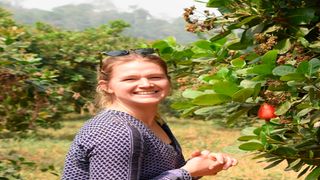
Marianne Duijm.
| PoolSeeds of Gold
Premium
Turning cashew waste into caramel
What you need to know:
- After harvesting cashews, many farmers extract the nut and throw away the fruit.
- Marianne Duijm, a Dane, has come up with a way to utilise the waste and earn farmers more cash.
Marianne Duijm, 28, has a big dream for cashewnut farmers, particularly those in Africa. Her dream involves adding value to the cashew apple, which is regarded by many farmers in Kenya and across Africa as a waste after extraction of the nut.
In Kenya, the cashew seed, which is a snack nut that is eaten on its own is only 10 per cent of the cashew apple. Thus, the rest, 90 per cent of the fruit, goes to waste.
“We mapped the social and environmental challenges of the cashew nut value chain and then came up with the idea that if we could make cashew apple interesting to the European market, it would be possible to reduce food waste, while also helping farmers improve their living conditions,” she told Seeds of Gold recently in Denmark.
With a friend, they realised that with the disposal of the bulk of the cashew apple, it is difficult for farmers to live off their plantations.
The two set about experimenting with juicers and dehydrators on the unused part of the cashew fruit by adding value to it and arrived at a food paste.
“The fruit is processed into a purée or paste, which is a concentrate after the removal of about 80 per cent of water. This paste can be used in food applications,” explains Marianne, who has formed a start-up known as Casju and is an MSc Design and Innovation Engineering 2019 graduate from the Denmark Technical University in Copenhagen.
The Dane then came up with the idea of coating cashew caramels made from the fruit paste with chocolate.
Cashew fruit caramels
“The fruit purée is added to a caramel base that has then been covered in dark chocolate.”
Following the collaboration with various chocolate and ice-cream producers, Casju is crowdfunding to launch its first plant based cashew fruit caramels.
“The caramels are sold here in Denmark. We did our first pre-sales through a crowdfunding in December 2020, where we sold 1,500 packages of caramels to 450 people. We did another crowdfunding and have sold to 180 people so far,” she added.
Currently, they have two suppliers of cashew fruit purée: Mim Cashews from Ghana and Biotan in Tanzania.
“At Biotan, the farmers are arranged in groups and deliver cashew nuts to nearby warehouses. We are still working on infrastructure for collecting the fruits. So far we have selected groups going to the farms, helping pick the fruits and bring them to the factory.”
She said sourcing cashews from Kenya is not out of question, but this has to depend on whether there will be ease in getting the raw materials.
“I started with Tanzania because I got in contact with a Danish cashew nut supplier, who grows organic cashews in Dar es Salaam.”
Reduce food waste
Marianne hopes to help African farmers to reduce food waste by making cashew fruit a popular ingredient in Europe.
In Kenya, cashew nuts remain one of the most important cash crops at the Coast. A 2020 report by the Nuts and Oil Crops Directorate shows that more than 22,000 hectares in Kilifi, Kwale, Lamu, Tana River and Taita Taveta counties host the crop.
Mark Chome, 45, a cashew nut farmer and a small processor from Tezo village, in Kilifi County, said a majority of farmers in the area grow the crop for nut harvest.
“Though there are some few farmers who use it to make local brew, but the drink is not very popular,” says Chome, who welcomed the value addition idea.
The cashew nut shell can be used as a fuel and the oil from the shell can also be extracted and used in cosmetic industry.
Charles Muigai, a nut industry consultant, said the Casju project is profitable to cashew farmers but this will depend on the market size.
“Currently, we do not even have mechanisms to harvest the cashew apple. We even produce less than is required due to the fact that most farmers don’t take good care of their crops.”





